高级书面表达指导之一
- 格式:doc
- 大小:43.50 KB
- 文档页数:4
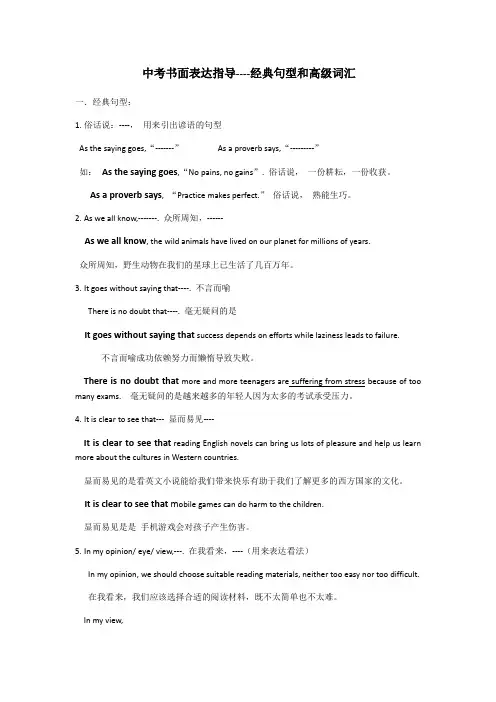
中考书面表达指导----经典句型和高级词汇一.经典句型:1.俗话说:----,用来引出谚语的句型As the saying goes,“-------”As a proverb says,“---------”如:As the saying goes,“No pains, no gains”. 俗话说,一份耕耘,一份收获。
As a proverb says, “Practice makes perfect.”俗话说,熟能生巧。
2.As we all know,-------. 众所周知,------As we all know, the wild animals have lived on our planet for millions of years.众所周知,野生动物在我们的星球上已生活了几百万年。
3.It goes without saying that----. 不言而喻There is no doubt that----. 毫无疑问的是It goes without saying that success depends on efforts while laziness leads to failure.不言而喻成功依赖努力而懒惰导致失败。
There is no doubt that more and more teenagers are suffering from stress because of too many exams. 毫无疑问的是越来越多的年轻人因为太多的考试承受压力。
4.It is clear to see that---显而易见----It is clear to see that reading English novels can bring us lots of pleasure and help us learn more about the cultures in Western countries.显而易见的是看英文小说能给我们带来快乐有助于我们了解更多的西方国家的文化。
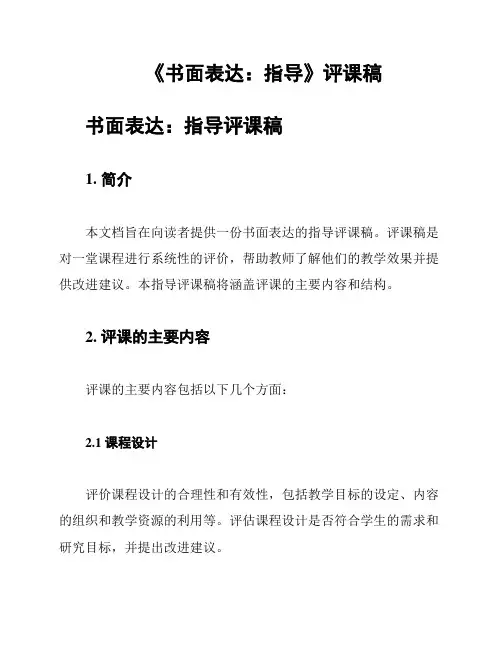
《书面表达:指导》评课稿书面表达:指导评课稿1. 简介本文档旨在向读者提供一份书面表达的指导评课稿。
评课稿是对一堂课程进行系统性的评价,帮助教师了解他们的教学效果并提供改进建议。
本指导评课稿将涵盖评课的主要内容和结构。
2. 评课的主要内容评课的主要内容包括以下几个方面:2.1 课程设计评价课程设计的合理性和有效性,包括教学目标的设定、内容的组织和教学资源的利用等。
评估课程设计是否符合学生的需求和研究目标,并提出改进建议。
2.2 教师的教学方法和技巧评价教师的教学方法和技巧是否适合学生的研究特点和需求。
评估教师的授课风格、教学资源的运用以及师生互动等方面,并提供改进意见。
2.3 学生参与和研究效果评价学生的参与度和研究效果,包括学生的积极参与程度、思维能力的培养和研究成果的达成等方面。
分析学生在课堂中的表现,并给予针对性的建议。
2.4 评估与反思评估整堂课的效果和价值,并为学生提供反思和改进的机会。
通过评估和反思过程,帮助学生更好地理解课程内容和教学目标。
3. 评课的结构评课稿的结构应包括以下几个部分:3.1 课程信息在评课稿的开头部分,应包括课程的基本信息,如课程名称、教师姓名、上课日期和时间等。
这些信息可以帮助读者更好地了解评价的背景和上下文。
3.2 评课内容评课的主要内容应详细描述课程设计和教师的教学方法和技巧。
在这一部分中,可以根据评估的准则和要点进行分析和评价,并提供具体的建议和意见。
3.3 学生反馈在评课稿的后半部分,应包括学生的反馈和研究效果的评估。
可以通过问卷调查、小组讨论或个别交流等方式收集学生的意见和建议,并分析学生的表现和研究成果。
3.4 总结与建议在评课稿的结尾部分,应对整堂课进行总结和评估,并提供针对性的建议和改进意见。
总结部分应简明扼要,重点突出,建议部分应具体明确,可行可操作。
4. 结论评课稿是对一堂课程进行系统化评价的重要工具。
本指导评课稿介绍了评课的主要内容和结构,希望对读者撰写评课稿提供一定的指导和帮助。
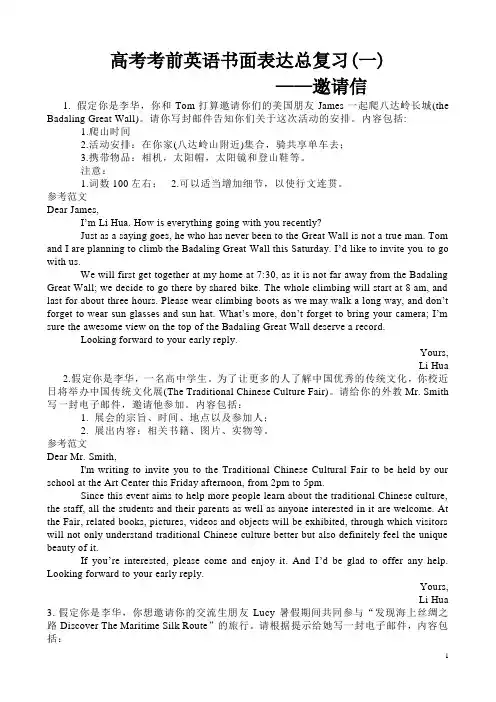
高考考前英语书面表达总复习(一)——邀请信1. 假定你是李华,你和Tom打算邀请你们的美国朋友James一起爬八达岭长城(the Badaling Great Wall)。
请你写封邮件告知你们关于这次活动的安排。
内容包括:1.爬山时间2.活动安排:在你家(八达岭山附近)集合,骑共享单车去;3.携带物品:相机,太阳帽,太阳镜和登山鞋等。
注意:1.词数100左右;2.可以适当增加细节,以使行文连贯。
参考范文Dear James,I’m Li Hua. How is everything going with you recently?Just as a saying goes, he who has never been to the Great Wall is not a true man. Tom and I are planning to climb the Badaling Great Wall this Saturday. I’d like to invite you to go with us.We will first get together at my home at 7:30, as it is not far away from the Badaling Great Wall; we decide to go there by shared bike. The whole climbing will start at 8 am, and last for about three hours. Please wear climbing bo ots as we may walk a long way, and don’t forget to wear sun glasses and sun hat. What’s more, don’t forget to bring your camera; I’m sure the awesome view on the top of the Badaling Great Wall deserve a record.Looking forward to your early reply.Yours,Li Hua2.假定你是李华,一名高中学生。


![高考复习:英语句子结构与书面表达写作指导[1]1](https://uimg.taocdn.com/636970f5c8d376eeaeaa3161.webp)
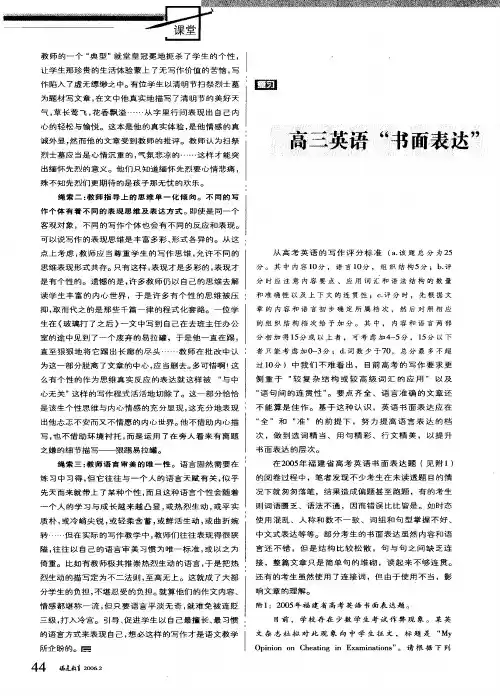
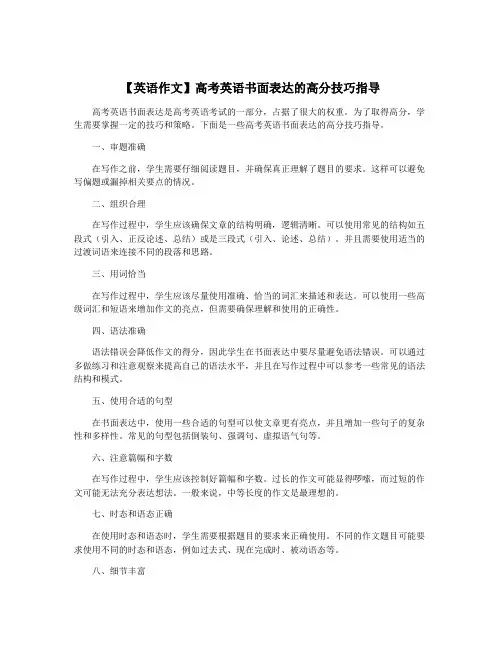
【英语作文】高考英语书面表达的高分技巧指导高考英语书面表达是高考英语考试的一部分,占据了很大的权重。
为了取得高分,学生需要掌握一定的技巧和策略。
下面是一些高考英语书面表达的高分技巧指导。
一、审题准确在写作之前,学生需要仔细阅读题目,并确保真正理解了题目的要求。
这样可以避免写偏题或漏掉相关要点的情况。
二、组织合理在写作过程中,学生应该确保文章的结构明确,逻辑清晰。
可以使用常见的结构如五段式(引入、正反论述、总结)或是三段式(引入、论述、总结)。
并且需要使用适当的过渡词语来连接不同的段落和思路。
三、用词恰当在写作过程中,学生应该尽量使用准确、恰当的词汇来描述和表达。
可以使用一些高级词汇和短语来增加作文的亮点,但需要确保理解和使用的正确性。
四、语法准确语法错误会降低作文的得分,因此学生在书面表达中要尽量避免语法错误。
可以通过多做练习和注意观察来提高自己的语法水平,并且在写作过程中可以参考一些常见的语法结构和模式。
五、使用合适的句型在书面表达中,使用一些合适的句型可以使文章更有亮点,并且增加一些句子的复杂性和多样性。
常见的句型包括倒装句、强调句、虚拟语气句等。
六、注意篇幅和字数在写作过程中,学生应该控制好篇幅和字数。
过长的作文可能显得啰嗦,而过短的作文可能无法充分表达想法。
一般来说,中等长度的作文是最理想的。
七、时态和语态正确在使用时态和语态时,学生需要根据题目的要求来正确使用。
不同的作文题目可能要求使用不同的时态和语态,例如过去式、现在完成时、被动语态等。
八、细节丰富写作的时候,学生应该尽量提供丰富的细节和具体的例子来支持自己的观点。
这样可以使作文更具说服力,并且增加文章的内容丰富度。
九、阅读优秀范文学生可以多阅读一些高分范文来学习和借鉴其中的语言表达和写作技巧。
可以注意范文的结构、用词、语法和句型,然后运用到自己的写作中。
高分的英语书面表达需要学生具备一定的语言能力和写作技巧。
希望上述的高分技巧指导对学生们取得优秀的成绩有所帮助。
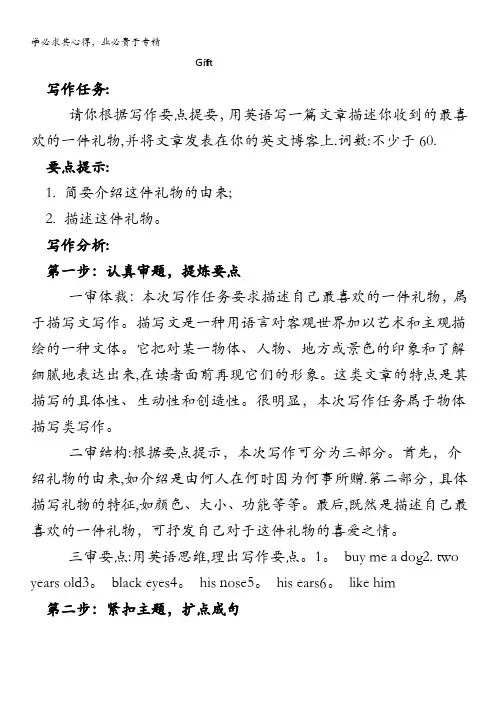
Gift写作任务:请你根据写作要点提要,用英语写一篇文章描述你收到的最喜欢的一件礼物,并将文章发表在你的英文博客上.词数:不少于60.要点提示:1. 简要介绍这件礼物的由来;2. 描述这件礼物。
写作分析:第一步:认真审题,提炼要点一审体裁:本次写作任务要求描述自己最喜欢的一件礼物,属于描写文写作。
描写文是一种用语言对客观世界加以艺术和主观描绘的一种文体。
它把对某一物体、人物、地方或景色的印象和了解细腻地表达出来,在读者面前再现它们的形象。
这类文章的特点是其描写的具体性、生动性和创造性。
很明显,本次写作任务属于物体描写类写作。
二审结构:根据要点提示,本次写作可分为三部分。
首先,介绍礼物的由来,如介绍是由何人在何时因为何事所赠.第二部分,具体描写礼物的特征,如颜色、大小、功能等等。
最后,既然是描述自己最喜欢的一件礼物,可抒发自己对于这件礼物的喜爱之情。
三审要点:用英语思维,理出写作要点。
1。
buy me a dog2. two years old3。
black eyes4。
his nose5。
his ears6。
like him第二步:紧扣主题,扩点成句1。
Last summer, in order to celebrate my entry into senior high school,my father bought me a dog.2。
The dog is two years old now。
3。
His black eyes make him look cute。
4. His nose is very good.5。
His ears are good.6. I like him very much。
第三步:补充修改,连句成篇范文一:Last summer, in order to celebrate my entry into senior high school, my father bought me a dog. The dog, which I named ”Doudou”, is two years old now. He has a black-spotted brown to white coat, and his watery black eyes make him look cute. Not only is his nose very good,but also his ears are good。
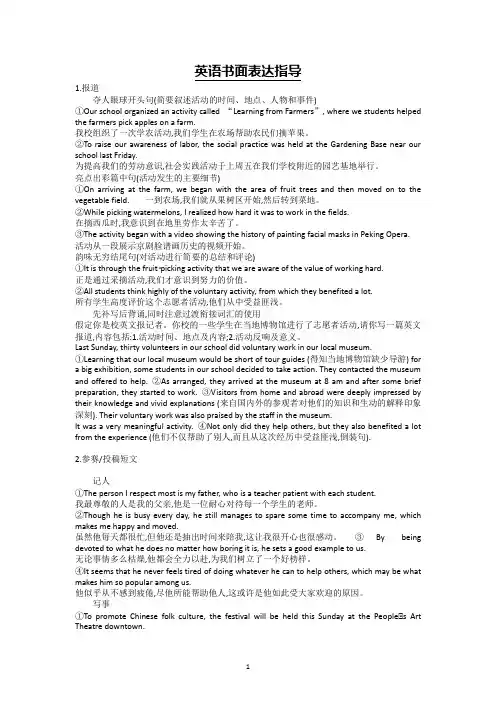
英语书面表达指导1.报道夺人眼球开头句(简要叙述活动的时间、地点、人物和事件)①Our school organized an activity called “Learning from Farmers”, where we students helped the farmers pick apples on a farm.我校组织了一次学农活动,我们学生在农场帮助农民们摘苹果。
②To raise our awareness of labor, the social practice was held at the Gardening Base near our school last Friday.为提高我们的劳动意识,社会实践活动于上周五在我们学校附近的园艺基地举行。
亮点出彩篇中句(活动发生的主要细节)①On arriving at the farm, we began with the area of fruit trees and then moved on to the vegetable field. 一到农场,我们就从果树区开始,然后转到菜地。
②While picking watermelons, I realized how hard it was to work in the fields.在摘西瓜时,我意识到在地里劳作太辛苦了。
③The activity began with a video showing the history of painting facial masks in Peking Opera.活动从一段展示京剧脸谱画历史的视频开始。
韵味无穷结尾句(对活动进行简要的总结和评论)①It is through the fruit⁃picking activity that we are aware of the value of working hard.正是通过采摘活动,我们才意识到努力的价值。
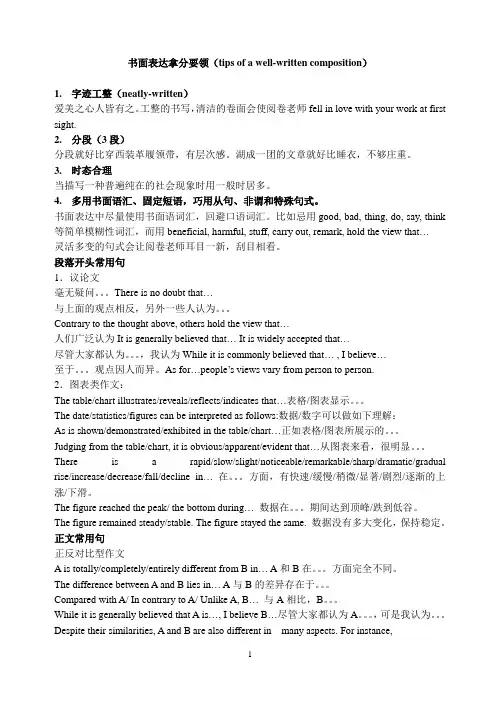
书面表达拿分要领(tips of a well-written composition)1.字迹工整(neatly-written)爱美之心人皆有之。
工整的书写,清洁的卷面会使阅卷老师fell in love with your work at first sight.2.分段(3段)分段就好比穿西装革履领带,有层次感。
湖成一团的文章就好比睡衣,不够庄重。
3.时态合理当描写一种普遍纯在的社会现象时用一般时居多。
4.多用书面语汇、固定短语,巧用从句、非谓和特殊句式。
书面表达中尽量使用书面语词汇,回避口语词汇。
比如忌用good, bad, thing, do, say, think 等简单模糊性词汇,而用beneficial, harmful, stuff, carry out, remark, hold the view that…灵活多变的句式会让阅卷老师耳目一新,刮目相看。
段落开头常用句1.议论文毫无疑问。
There is no doubt that…与上面的观点相反,另外一些人认为。
Contrary to the thought above, others hold the view that…人们广泛认为It is generally believed that… It is widely accepted that…尽管大家都认为。
,我认为While it is commonly believed that… , I believe…至于。
观点因人而异。
As for…people’s views vary from person to person.2.图表类作文:The table/chart illustrates/reveals/reflects/indicates that…表格/图表显示。
The date/statistics/figures can be interpreted as follows:数据/数字可以做如下理解:As is shown/demonstrated/exhibited in the table/chart…正如表格/图表所展示的。
高三书面表达指导在写作中活用谚语的技巧一、引用谚语的技巧1. 用as the saying goes来引出谚语,其意为“常言道”“正如有句谚语所说”;它可以放在句首,也可以放在句末,有时也可放在句子中间。
如:“More haste less speed,”as the saying goes. 常言道:“欲速则不达。
”“Accidents will happen,”as the saying goes. 正如有句谚语所说:“天有不测风云。
”As the saying goes, “Don’t count your chickens before they’re hatched.”正如有句谚语所说:“蛋未孵化,莫数小鸡。
”However, as an old saying goes, a coin has two sides. Having a private teacher also has its disadvantages. 但是,正如有句谚语所说:“每个硬币都有两个面。
”请家庭教师也有其不利之处。
From my point of view, taking more physical exercises is a good way to solve these problems. Just as a saying goes: “Only work no play makes Jack a dull boy.”依我的看法,多进行体育锻炼是解决这个问题的一个好办法。
正如有句谚语所说:“只工作不玩耍,聪明孩子也变傻。
”2. 用There is a saying going like this 来引出谚语,其意为“有句谚语是这样说的”。
如:There is a saying going like this, “A friend in need is a friend indeed.”What is a true friend?A true friend is a person who can share your happiness and sorrow. 有句谚语是这样说的:“患难见真情。
位敦市安定阳光实验学校长中学高三英语二轮复习书面表达复习话题指导专题08 健康饮食话题指导(教师)实例指导1――学生如何饮食【写作任务】如今随着人们生活水平的提高,市场脂肪、高热量、高蛋白的食品也越来越多;据一份调查表明中有五分之二的中学生属于胖子行列。
从健康和美学的角度来讲,他们都能够减肥。
原因:偏食挑食;不吃早餐;饮食过度;高热量食品措施:多吃蔬采、水果;饮食要规律个人看法:饮食要平衡、合理……请你结合生活实际就如何合理饮食发表自己的看法,写一篇120-150词的英语短文。
【教师点评】本文紧扣主题, 结构分明,分段描述了不良的饮食习惯及其坏处,最后还表达了自己的观点。
语言地道得体,词语和句型使用较规范,例如—些词;In terms of , rather than , be particular about , do harm to , as far as I I'm concerned 的用,而且还注意到了过渡词汇的运用:however,and still , therefore,what’ s more;在第二段的描述中避免了一味地运用first,second,third,而是采用了some …some…others以及and still来清晰条理地写出了各种不良的饮食习惯。
另外还使用了灵活句式:Therefore,we should have a balanced diet including vegetables and fruits,which is good for our health.这是一个句意充实,结构复杂的句子,其中包含一个现在分词短语作语和一个非限制性语从句,Only in this way can we keep fit and have enough energy to devote ourselves to study. ed,we should develop to study. 这是一个only +状语放在句首,句子要倒装的语法点。
高级英语书面表达指导之一------------------------------------------------一、熟练掌握英语基本句型和常用句型句子是文章的基本单位,只有熟练地掌握了基本句型及常用句型,你才能灵活自如地进行书面表达,因此,高三复习阶段,基本句型及常用句型的训练仍是写作训练的重点,学生尤其应多做些一句多译的练习。
基本句型有五种:(1)主语十系动词十表语(2)主语十谓语(十状语)(3)主语十谓语十宾语(4)主语十谓语十间接宾语十直接宾语(5)主语十谓语十宾语十宾语补足语。
现将基本句型及常用句型分述如下:句型一:主语十系动词十表语表语可以用名词、形容词、介词短语、-ing形式、不定式、过去分词、副词和从句等充当。
例:1.The meeting is very successful.会议很成功。
2.The meeting is quite a success.会议很成功。
3.Mary is afraid of snakes.玛丽怕蛇。
4.I am sure that he will succeed in the future.我相信将来他会成功。
5.The film is interesting.这电影很有趣。
6.What’s on the weekend?这周末上映什么?7.The reason why he came late was that he didn’t catch the early bus.他来晚的原因是他没赶上早班车。
8.My dream came true at last.我的梦想终于实现了。
句型二:主语十谓语十状语在这个句型中,谓语由不及物动词和相当于不及物动词的短语来充当。
状语可由副词、形容词、名词、介词短语、不定式、-ing形式、过去分词或with的复合结构来充当。
例:1.She dances beautifully.她舞姿很美。
2.Peter lay in bed ,deep in thought . 彼得躺在床上,陷入沉思。
3.He returned to collect money.他回来取钱。
4.He sat by the fire,reading a novel.他坐在炉火旁,读着一本小说。
5.He came into the room with a book in his hand . 他手中拿着一本书,走进房间。
6.Here must be something wrong with the machine . 机器一定出毛病了。
7.There stands a tower on the top of the hill . 在山顶上耸立着一座塔。
句型三:主语+谓语+宾语此句型中谓语用及物动词或相当于及物动词的动词短语来充当。
宾语可由名词、代词、-ing 形式、不定式或从句担当。
1.He plays basketball very well . 他打篮球非常棒。
2.Have you heard from her lately ? 最近你收到她的来信了吗?3.I am looking forward to the day when Taiwan returns to China .我一直盼望着台湾回归的那一天。
4.I don’t mind your opening the window . 你打开窗户我不介意。
5.I didn’t mean to hurt you . 我无意伤害你。
6.Please find out when the meeting will begin . 请弄清会议什么时候开始。
句型四:主语+谓语+间接宾语+直接宾语间接宾语由名词或代词担当,直接宾语可以由名词、从句、疑问词+不定式来充当。
例:1.Remember to write us a note when you get there . 到那里时,记住给我们写封短信来。
2.I’ll ask him why he didn’t attend the meeting . 我问他为什么没来参加会议。
3.Would you teach us how to drive a car?你愿意教我们如何开车吗?4.Please tell me what to do next . 请告诉我下一步做什么。
句型五:主语十谓语十宾语十宾语补足语宾话由名词或代词充当。
宾语补足语由名词、形容词、副词、介词短语、-ing形式、过去分词或不定式来充当。
例:l.We made him captain of the ship . 我们选他当船长。
2.We must keep the room clean . 我们必须保持房间的清洁。
3.We all expect you back early . 我们都盼着你早点回来。
4.We found everything there in good order.我们发现那儿的一切井然有序。
5.I saw a girl crying in the corner.我看见有个女孩在角落里哭。
6.What makes you think so?什么使你这样想?常用句型:1.be worth doing 值得做……2.be busy doing忙着做……3.too---to do 太……而不能徽…··4.so+adj./ ad. as to do 如此……以致于做5 It takes sb. some time to do sth. 花某人……时间做某事6. sb. spends some time doing sth.某人花……时间做某事7. It is+adj.+for sb.to do sth.某人做某事是……8. It’s up to sb. to do sth.应由某人做某事9. sb.have some difficulty/trouble in doing sth.某人做某事很费劲10.The more ---the more…越……越……11.It’s no good/use doing sth.做某事没好处/用处。
12.sb.can do nothing but do sth.=have no choice but to do 别无他法,只能做某事13.There be / lie stand / live--- 有------ 14.be about to do sth. when--- 正要做某事这时---- 15.It was not long before --- 不久就------It will not be long before--- 要不了多久就------16.It is +一段时间+ since --- 自从------以来,有------时间了17.It is said that --- 据说------ 18.not ---until / till --- 直到------才19.祈使句+and / or +分句(将来时)20.主语+find / consider /think +it +形容词或名词+不定式21.so +adj./ adv.+that --- 如此------以致于such +n. +that ---22. Why not do sth. ? 为什么不做……呢?Why do sth. ?为何做-------?23.主语十hit/strike/beat/touch/grasp/seize/catch…+sb.十介词十the十表示身体部位的名词。
24.It’s time to do sth. / It’s time +sb. did sth. 到做某事的时间了25.sb.devote oneself/one’s life to sth./doing.致力于做某事26.It happened that…/sb. happened to do sth.碰巧------27. It is/was十被强调部分十that/who…28.I don’t think/believe/suppose/expect that 从句(否定前移)29.would like to do 愿做某事/ feel like doing 想做某事had better(not)do sth. 最好(不)做某事/ would rather do 宁愿做……30.There is no need to do sth.没必要做……31.主语十have no idea十从句不知道……32.I doubt whether十从句我怀疑……I don’t doubt that十从句我不怀疑……33. no matter when/where/what/who/whether/how十从句十主句无论……34.what/who/where/when..do you think…你认为什么/谁/ 哪里……35 used to do 过去常做某事/ be used to doing 习惯于做某事/ be used to do sth.as soon as…36.the moment--- 一------就--------immediately---37. no sooner…than /hardly…when —……就……38.It is possible / probable/likely that…可能……39. Do you mind if I do?/Would you mind if I did?我做某事你介意吗?40. wish sb.+n. /adj.祝愿某人------二、注意以下过渡词的用法1.表示时间的af first(起初)next(接下来)then(然后)later(后来)soon(不久)soon/shortly after(……之后不久)finally(最后)in the end(最后)eventually(最终)at last(终于)lately(近来)recently(最近)since then(自从那时起)after that(从那以后)in no time(不一会儿)after a while(一会儿)afterward(后来)to begin/start with=in the first place(首先,第一点)immediately(立即、马上)meanwhile=in the meantime=at the same time (当其时)until now(直到现在)suddenly=all of a sudden(突然)as a young man(当……是个年轻人的时候)at the age of…(在------岁的时候)as early as(早在……的时候)as soon as(—……就……)before,the other day(几天前)early in the morning (大清早)after/before dark(天黑后/前)one day(有一天)one afternoon(一天下午)one morning (一天早晨)2表示空间的to the right/left(朝右/左)on the right/left(在右/左边)in the middle of(在中间)in front of(在前面)in the front of(在前面)at the back of(在后面)at the bottom of(在底部)on the edge of(在……的边上)on top of(在……的顶部)opposite to(与----相对)close to(靠近)near to(在……附近)next to(与……相邻)under(垂直在下)over(垂直在上)below(在下方)above(在上方)across(在……的另一边)around(在周围)behind(在后)before(在前)against(靠着、抵着)further on(再往前)3.表示列举和时序first ,second , third , ----finally firstly,secondly,thirdly …finallyfirst of all , next ,and then , lastly for one thing… for another…at the same time at first at last4.表示列举for example(例如…)namely(即…·)for instance(例如:……)that is (to say) (也就是说)such as(如…·)take…for example (拿……来说)like(像……)5表示比较或对比like(像)unlike(不像)similarly(同样地)in the same way(以相同的方式)compared to (与…··相比)while(而)still =nevertheless(然而)on the contrary(正相反)different from(与……不同)on(the)one hand…on the other hand(一方面……另一方面)in contrast with与……成对比)6.表示增补and(而且)both---and(不但……而且)not only---but also (不但……而且)as well as(不但……而且)also=besides=furthermore=more over(此外、而且、再者)in addition(并且)apart from(除了—…·之外)what’s more (而且、加之、更重要的)for another(另一方面)worse still=what’s worse=to make matter worse(更糟糕的是)including ( 包括)7.表示因果because(因为)since(既然)as(由于)now that(既然)therefore(因此)thus (这样)so(所以)as a result (of) (结果)because of =on account of (因为)= thanks to(多亏、由于)for this reason(由于这个原因)if so (如果这样)if not(如果不是这样)8.表示目的for this purpose in order to do so as to do so that…in order that.、.9.表示让步though/although no matter十疑问词in spite of whatever/however/whoever even if/even though10.表示强调besides(况且)what’s more(更重要地是)thus(这样)above all (首先)indeed(的确)in fact =as a matter of fact (事实上)in other words(换句话说)in that case (那样的话) or rather (更确切地说)particularly(特别地)11.表示转折but(但是)still (然而)however(然而)while (而)12.表示总结in a / one word(简言之、一句话、总之)generally speaking(一般说来)in short=in brief =in a few words (简言之) in conclusion =lastly (最后地)on the whole=taking everything into consideration (从总体来看、大体上)so(所以)therefore(因此)thus (这样)as has been mentioned (正如所提到的)it is quite clear that (很显然)there is no doubt that(毫无疑问)it is well-known that (大家都知道)as we all know=as is known to us all(大家都知道)as / so far as I know (据我所知)to sum up=to summarize=in summary (总之)13.表示转换话题by the way(顺便说)I am afraid (我恐怕)in my opinion (依我看来)to tell the truth(说实话)to be honest(诚实地说)in fact (事实上)。